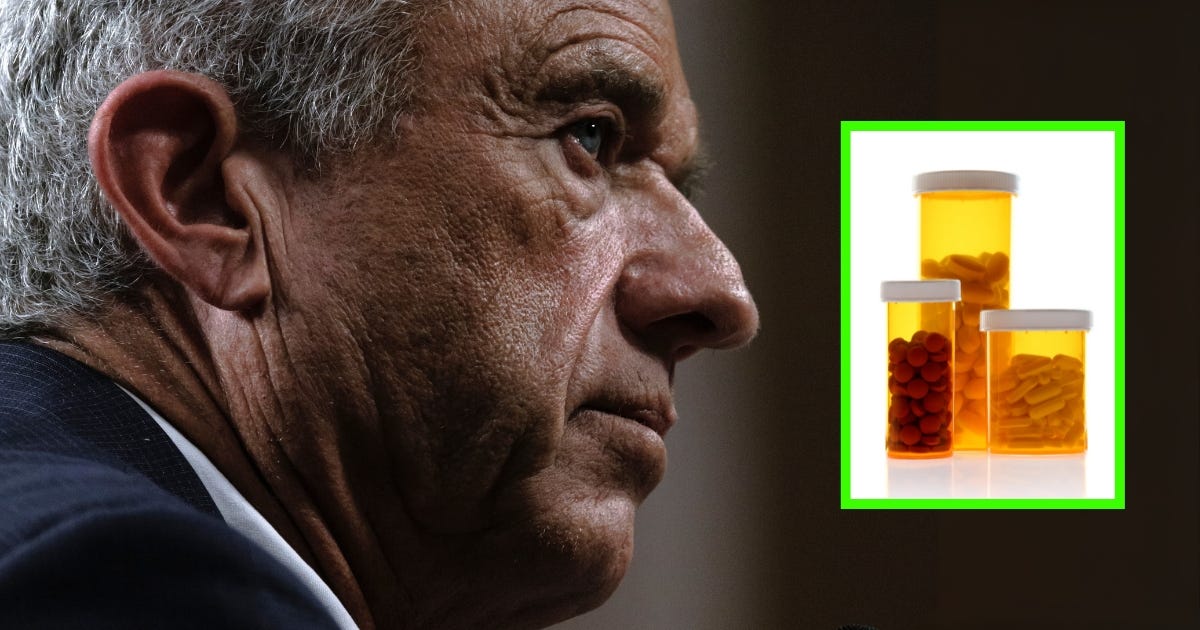Several Mass Shooters Have Taken Psychiatric Drugs. RFK Wants Answers.
They don’t want you asking these questions.
This article originally appeared on the Daily Caller News Foundation and was republished with permission.
Guest post by Hudson Crozier
The use of common psychiatric drugs among some of the most infamous mass murderers in American history is prompting the Trump administration to investigate whether they contribute to violent behavior.
Widely available antidepressants, including selective serotonin reuptake inhibitors (SSRIs), have been used by several mass shooters prior to their killing sprees that took three or more lives. Health and Human Services (HHS) Secretary Robert Kennedy Jr. announced Aug. 28 that his officials are investigating potential links between the drugs and violence, a concern that skeptics such as Kennedy have raised for years.
“There is shockingly little investigation into the role of psychiatric medications in acts of mass violence,” psychiatrist Dr. Josef Witt-Doerring told the Daily Caller News Foundation. He also serves as the CEO and medical director of TaperClinic in California.
“These side effects are exceedingly rare, making them nearly impossible to detect in clinical trials, which only enroll small numbers of patients. Instead, careful case-by-case investigation is needed,” Witt-Doerring said.
An HHS spokesperson declined to tell the DCNF specifics about its new studies.
Scholarly research on psychiatric drugs from around the world has brought mixed or inconclusive findings. A 2019 Swedish study found that SSRIs can be associated with increased suicidality risk but fell short of saying the drugs cause it. A more recent 2022 study from New York researchers found no significant link between SSRIs and aggressive behavior.
“Determining whether a drug contributed to a violent act is not always clear-cut, but without thorough examination of these cases, we will remain in the dark about how often medications play a role,” Witt-Doerring said.
Investigations of some recent mass murderers showed no evidence of medication use, including the Islamic radical who killed 49 people at an Orlando, Florida, nightclub in 2016 and the Sandy Hook Elementary School shooter who killed 27 in Newton, Connecticut in 2012. But the stories of other killers offer horrific examples of when the drugs did not result in a better mental state.
The Paxil Case
Donald Schell was 60 years old in 1998 when he began taking the drug Paxil, manufactured by GlaxoSmithKline, to help with his depression, as covered in news reports. Two days after taking them, he shot his wife, daughter and his infant granddaughter to death in their Gillette, Wyoming, home before killing himself.
The case became a rare example of a court blaming violent acts on an antidepressant.
Schell’s surviving family members filed a wrongful death lawsuit in 2001 against GlaxoSmithKline, with their lawyer alleging that he had no violent history before taking the drug, The Los Angeles Times reported. Schell previously told a relative he experienced hallucinations while taking Prozac years before, court testimony showed, according to The Wyoming Tribune Eagle.
A jury ruled that the Paxil drug was 80% responsible for Schell’s actions and awarded his family $6.4 million. A court later rejected GlaxoSmithKline’s appeal, court documents show.
Columbine High School
Eric Harris, then 18, had the SSRI medication Luvox in his system when he joined Dylan Klebold in a shooting massacre at Columbine High School in Colorado in 1999, killing 13 people before fatally shooting themselves, CBS News reported. A therapeutic dosage of the drug was found in Harris’ body after he died, the Jefferson County coroner’s office said. A toxicology report found no drugs in Klebold’s body.
Luvox is commonly used to treat obsessive-compulsive disorder and depression. The Food and Drug Administration (FDA) approved it for use in 1994.
A survivor of the shooting sued Solvay Pharmaceuticals, the maker of Luvox, in 2002, claiming it should have known the drug was unsafe for children and could induce dangerous behavior. The company denied the allegations and settled the lawsuit the following year in exchange for donating $10,000 to the American Cancer Society.
Aurora Movie Theater Massacre
Police found bottles of clonazepam and sertraline in the home of James Holmes, who killed 12 and injured 70 in a shooting at an Aurora, Colorado, theater that was screening “The Dark Knight Rises” in 2012, according to police documents and testimony. The psychiatrist who prescribed Holmes the drugs testified that the shooter confessed to having “homicidal thoughts” as often as three or four times per day in the months ahead of the killings.
Psychiatry professor David Healy blamed the drugs after meeting Holmes in prison as an expert witness for his defense, the BBC reported. “These killings would never have happened had it not been for the medication James Holmes had been prescribed,” Healy said in 2016.
Healey never got the chance to testify, as jurors rejected an insanity defense by Holmes’s team.
Parkland School Shooting
Nikolas Cruz went through a variety of behavioral health medications and therapy sessions before fatally shooting 17 people and wounding 17 others at a Parkland, Florida, high school at age 19 in 2018, according to multiple reports.
Cruz started the medication at age 6 and was prescribed drugs at different points during his teenage years, including Focalin XR, Risperdal, Strattera, Concerta and Clonidine, doctors familiar with his health history testified in court. Many of the medicines were intended to treat his symptoms of attention deficit hyperactivity disorder, or ADHD. Police had received at 19 calls for incidents involving Cruz’s behavior, such as reports of fighting with his brother and throwing his mother against a wall, CNN reported.
The Covenant School
Future school shooter Audrey Hale began mental health treatment at six years old and suffered from depression, anxiety, anger management issues and a wealth of other psychological problems throughout her life, according to a police investigative summary from March. At age 28, she opened fire at the Covenant School in Nashville, Tennessee, killing three children and three adults before being fatally shot by police.
Hale, who identified as transgender at the time of her death, began regularly taking medication for her conditions under multiple medical professionals from 2011 until her death, but her “anxiety, depression, and rage only escalated,” the summary report said.
“The only records found to show Hale had a negative interaction with those medications were either shortly after medication was adjusted or if Hale consumed alcohol while taking the medication,” reads the March report. “In those cases, the negative interactions appeared to have been rectified quickly.”
The anxiety medications Ativan, Hydroxyzine and Buspirone and an SSRI called Lexapro were among Hale’s prescriptions, The Tennessee Star reported, citing documents stemming from a police probe.
‘These Risks Are Not Speculation’
The federal government harbored concerns about psychiatric medications long before Kennedy helmed HHS.
The FDA ordered manufacturers in 2004 to put warning labels on several antidepressant drugs, citing a possible increased risk of suicidal behavior among patients using them.
“Anxiety, agitation, panic attacks, insomnia, irritability, hostility, impulsivity, akathisia (severe restlessness), hypomania, and mania have been reported in adult and pediatric patients being treated with antidepressants for major depressive disorder as well as for other indications, both psychiatric and nonpsychiatric,” the FDA said at the time. The agency did not say whether the medications caused these problems.
“These risks are not speculation — they are already printed in FDA drug labels,” Witt-Doerring told the DCNF. “While the vast majority of people taking psychiatric medications will never become violent, these drugs can profoundly alter brain chemistry, emotional regulation, and impulse control.”
SSRIs can reduce the brain’s emotional responses to violence, according to a 2018 study by researchers from the U.S., Germany and Australia who observed the brain activity of males playing a violent video game.
Doctors often hand out the medications mixed with other prescriptions and without monitoring patients closely, which could set the stage for the side effects seen in extreme cases, according to Witt-Doerring.
“Unfortunately, due to the horror and loss of life following these events, many families and experts are hesitant to pursue such evaluations,” Witt-Doerring told the DCNF. “They fear that even raising these questions could appear as though they are making excuses for the tragedy, inviting public backlash. Many simply want the events closed so they can grieve and move forward.”
“However, the government has a duty to investigate threats to public health,” the psychiatrist said.
Copyright 2025 Daily Caller News Foundation


